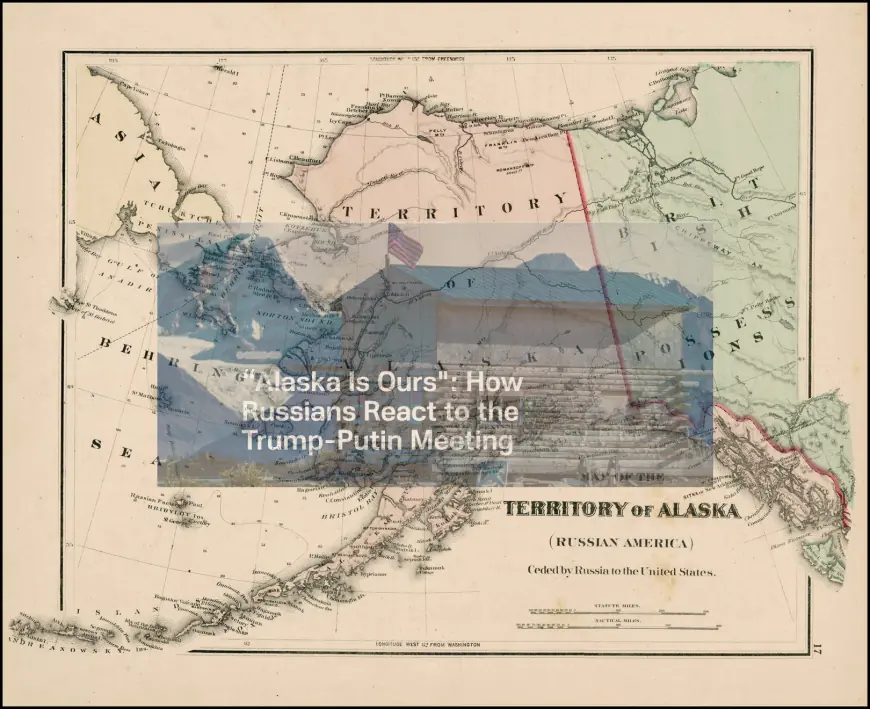Alaska Is Ours: Moscow’s propaganda marchine
As Putin prepares to meet Trump in Alaska, Russia’s propaganda machine is weaponizing the territory’s history, reigniting claims that the US state still belongs to Moscow.

US President Trump will sit down with Russia’s leader, Vladimir Putin, in Alaska on Friday, August 15, 2025. Trump has said he will attempt to secure the return of “some territory” for Ukraine. In the same breathless news cycle, pro-Kremlin outlets have revived a familiar fantasy: that Alaska, sold by the Russian Empire to the United States in 1867, was never truly America’s to keep.
For Ukrainians, this isn’t just noise. It’s the same strategy they’ve faced for years: flood the space with spectacle, obscure accountability, and turn a war of aggression into a circus of “what ifs.”
Why Alaska and why now
- Diversion: When Kyiv’s territorial integrity is on the table, shifting attention to U.S. soil reframes the story from Russian withdrawal to Russian grievance. It’s a bait-and-switch from “returning Ukrainian land” to “reclaiming historic Russian land.”
- False equivalence: Kremlin messaging thrives on both-sides narratives. If borders everywhere are “contested,” then Russia’s occupation of Ukrainian territory becomes just one more dispute—rather than a violation demanding reversal.
- Testing resolve: Floating Alaska stirs U.S. domestic emotions and partisan reflexes. The goal isn’t legal restoration; it’s to fracture consensus on supporting Ukraine and to make any outcome of the meeting appear as a “compromise” rather than a demand for accountability.
The legal and historical reality
- The 1867 sale: The United States purchased Alaska from the Russian Empire via a signed treaty and payment of $7.2 million—about $130 million in today’s money. More than 150 years later, Alaska remains a symbol in Moscow’s messaging. By any modern legal standard—treaty, transfer, recognition—the claim is settled.
- No standing claim: Contemporary Russia has no recognized legal basis to contest U.S. sovereignty over Alaska. The “still ours” line is a political slogan, not an argument.
- Why propaganda leans on it: Myths that are easy to picture—maps, flags, old borders—spread faster than legal details. Alaska is a perfect meme: visually evocative, emotionally charged, historically distant enough to be elastic.
How the narrative harms Ukraine
- Erodes clarity about aggression: The more oxygen Alaska gets, the less public attention stays on occupied Ukrainian regions that international law and countless resolutions recognize as Ukrainian.
- Normalizes coercion: Talking about trading land—any land—coolly and hypothetically dulls the edge of the principle that borders cannot be changed by force.
- Undercuts negotiations: If the meeting narrative drifts toward spectacle, concrete outcomes for Ukraine—prisoner exchanges, humanitarian corridors, energy infrastructure protection—risk being sidelined by headline-chasing theatrics.
What Ukrainians need from Alaska
- Center Ukraine’s sovereignty: Any discussion that doesn’t begin with full restoration of Ukraine’s internationally recognized borders is a detour.
- Concrete deliverables:
- Security: Air defense systems, munitions supply, and long-horizon commitments.
- Justice: Mechanisms for accountability and reparations tied to documented damage.
- Humanitarian: Scalable demining support, energy grid hardening, and medical evacuation capacity. - Narrative discipline: Allies should preempt Alaska chatter by reiterating the basics: Russia sold Alaska; Russia invaded Ukraine; the remedy is withdrawal, not theatrical cartography.
What to watch at the meeting
- Specifics over symbolism: Are there explicit timelines, systems, and quantities for Ukrainian support—or just broad assurances?
- Language on territory: Does “some territory” translate into unequivocal backing for Ukraine’s borders, or does it become code for freezing lines and rewarding occupation?
- Accountability measures: Are there steps toward tribunals, asset seizures for reconstruction, and consequences for continued strikes on civilians?
- Disinformation guardrails: Do U.S. and allied statements swat down Alaska narratives promptly, or leave them to metastasize?
The stakes
For Ukraine, the Alaska spectacle is a reminder that wars are fought with missiles and with stories. One decides who holds ground; the other decides how long the world cares. If the meeting produces clarity—on borders, on support, on accountability—the propaganda loses oxygen. If it produces only headlines, Moscow’s myth-makers win a news cycle, and Ukrainians lose time they can’t afford.
Reward this post with your reaction or TipDrop:
 Like
0
Like
0
 Dislike
0
Dislike
0
 Love
0
Love
0
 Funny
0
Funny
0
 Angry
0
Angry
0
 Sad
0
Sad
0
 TipDrop
0
TipDrop
0




























